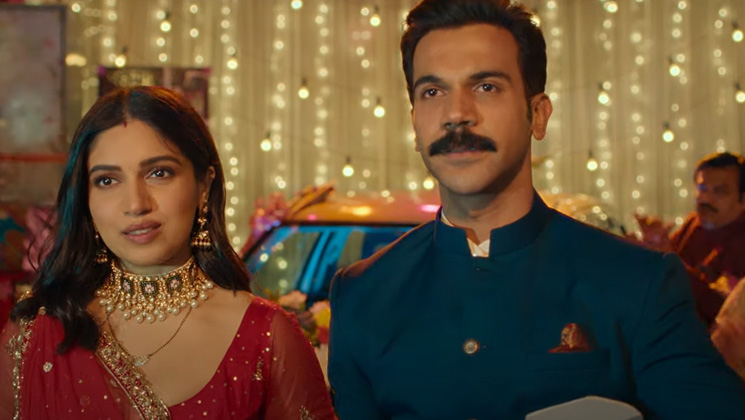Though ‘Badhaai Do’ is not exactly a sequel to the 2018 hit ‘Badhaai Ho’, it is a part of the franchise spawned by Junglee Pictures. Amit Trivedi is known for doing solo albums but here, he shares the credit with four other composers. With four original tracks (not counting their ‘alternate’ versions) Amit is still the main composer here. The rest of the composers have one song each to their credit. One of the guest composers on the album, interestingly, is Khamosh Shah who had made his debut with the director’s (Harshavardhan Kulkarni) earlier film ‘Hunterrr’ which marked his debut as a film composer. After that film, one didn’t get to hear Khamosh’s music in any film. One wishes he was given more than one track to do here, considering the fact he had put together a very interesting soundtrack for ‘Hunterrr’.
The album opens with the heavily promoted “Badhaai Do”, the title track that has been composed by Tanishk Bagchi and written by Vayu. The track sounds nothing more than a recycled version of ‘Sweety Tera Drama’ that, incidentally, had the same composer-lyricist team. The film, too, was produced by the same production house (Junglee Pictures). That makes one wonder whether the producers directed the composer to come up with a similar tune. Even if you keep the comparisons aside, the song doesn’t have much going for it except for the spirited rendition by Nakash Aziz.
Amit Trivedi opens his account with “Atak Gaya”, a romantic number that benefits hugely from Varun Grover’s lyrics and Arijit Singh’s rendition. The song bears a strong similarity to “Sooiyan” which was composed by Amit for the film ‘Guddu Rangeela’. That song, too, was sung by Arijit. The over-familiarity that comes with the song makes it difficult for you to enjoy it. There are two other versions of this song. The acoustic version is sung by and is dominated by the sound of acoustic guitar and electronic pads. The third version has been sung nicely by Abhijeet Srivastava with backing vocals by Rupali Moghe.
“Hum Thay Seedhe Saadhe”, the best song on the album, comes in three different versions. In terms of composition, arrangements and lyrics, the three versions are identical to each other. Each of the version, however, has a different singer. The tune is highly infectious and has an old-world charm to it that you connect to instantly. Flute and strings have been used interestingly in the song but Amit could have worked harder on the arrangements. “Khaali ghoomti thi nazar tujh pe ab bahaar hui hai, hum the seedhe saade magar aankhon se majaal hui hai” – Varun Grover writes the kind of lines that batuily complement the gorgeous tune.
Out of the three singers, Abhay Jodhpuurkar’s rendition is the best. All the three singers pronounce “saadhe” as “saade”. Perhaps, the lyricist was not present during the recordings, otherwise he would have ensure that this did not happen.
Right from the very first note, “Gol Gappa” sounds so identical to ‘Radhe’, a single composed by Amit, that you are tempted to hear the latter after listening to he first one. After comparing the two songs, you realize while these are two different tracks, there is a lot of similarity between them. In fact, ‘Gol Gappa’ reminds one of a bunch of other songs composed by Trivedi including “Sweetheart” (‘Kedarnath’). In the past, Amit has, consciously or unknowingly, represented many of his older tunes in a new avatar and that has robbed of the charm of listening to the new track.
Ankit Tiwari has contributed dozens of romantic tracks to films which he worked as a guest composer on. For this film, he delivers a techno dance number in the form of “Bandi Tot” that has an immensely forgettable tune and insipid lyrics (Anurag Bohamia). The composer and the lyricist’s desperate attempts towards making a ‘catchy, hit song’ are visible but nothing they do manages to salvage this track.
“Ek rang dubla toh ek haan milaayenge, ek rang nadiya se, ek subah se uthaayenge”, the lyrics that Varun Grover has written for “Hum Rang Hain” exemplify the theme of the film and also give us an inkling that it could have been used in the climax of the film. The choral vocals and sweeping arrangements indicate that this song arrives at a crucial juncture in the film when the two protagonists try to preach the importance of acceptance to a group of people. Though not excellent, the tune grows on you with time. Varun’s poetry, undoubtedly, is the highlight of the song.
Last to arrive is Khamosh Shah’s “Maange Manzooriyan”. It’s a render melody that does not break any new ground but is pleasant enough. The antara portions are more effective than the mukhda. “Tedhe medhe akharon mein lighti hain yeh arziyaan, pyaar se boli mein meethi meethi si yeh pattiyan”, with lines like these Azeem Shirazi proves why he is one of the most underrated lyricists around. The song has two versions, one sung by Malavika Manoj and the other rendered by Abhay Jodhpurkar. Malavika’s voice has an interesting texture that works for the song but Abhay’s rendition is much better. Just compare the ways the two singers have rendered the line “mere kamre mein aahatein teri….” and you will know what one is talking about here.
‘Badhaai Do’ has a terrific song in the form of ‘Hum Thay Seedhe Saadhe’. A couple of other songs work too but largely, the album does not really impress. At 47 minutes, this is one of the longest film albums released in the recent times. While quantity is not an issue here, quality certain is.

